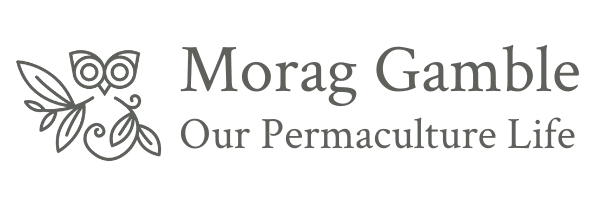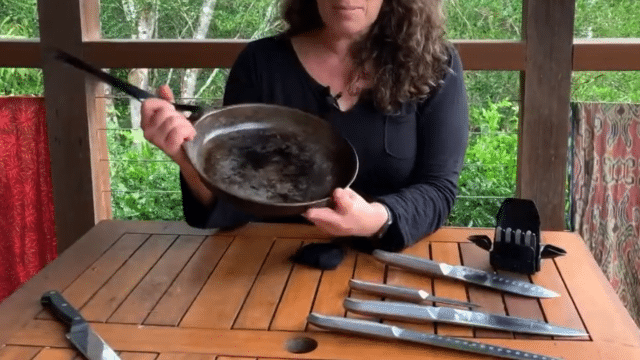Carefully choosing things for our daily life that last and last leads us away from the culture of consumables. So many things that should last decades or even lifetimes, are now disposable, non-fixable items.
They may cost more up-front, but when we calculate the overall cost in the long term, and to the planet, it is certainly a good investment.
Make it a shared gift from your family or look for quality second-hand items that you can restore. A few well-made adaptable essentials is so much better than a clutter of short-lived, single-purpose products.
To learn more about growing a permaculture gardening simply and easily, check out our course The Incredible Edible Garden and learn how to design your own permaculture landscape in our Permaculture Design Course.

Hi! Welcome back, it’s Morag from Our Permaculture Life and the Permaculture Education Institute and it’s plastic-free July. And every day, since the first of July, I’ve been exploring different ways that we can get rid of single-use plastics in our lives. Different ways that we can do everyday, things in the garden or in the home that can help to just release us from those things. So that we’re having less waste in the world.
Now one of the things that I wanted to talk about, was some of the things that we choose that are really long lasting and really high quality. I don’t know about you, but when it gets to my birthday and someone asks me, my family asks me. So what would you like for your birthday? And I think, I don’t know, I don’t really need anything or want anything. But actually this year, I kind of thought actually what I would really like would be a really good set of knives. Because typically I’d only ever just bought the relatively cheap ones that you can get in standard stores. And you know, the thing is, they only last for a couple of years before they’re just so blunt. You can’t sharpen them on this bit, it starts to fall apart and they just don’t chop very well. And the whole joy of cooking is really not there. So I saw up in one of the local shops in my local town. It’s a place where they’ve collected all the different things together like all the natural organic sheets and organic towels. And locally made cups, and australian-made knives, and pans and all different sorts of things and they were having a sale. I thought okay, now’s the time to do it.
So I found a selection of knives that I really liked and I like these ones, because they are australian knives. They’re made out of one bit of steel, they’ve got 25 years of what’s it called guarantee on them. So like they’re a lifetime purchase and they’re just so well balanced. And so I came home and with my kids, we chose them too and they’re just so well balanced and we really enjoy cooking up using these. Now the thing is that, normally you know I wouldn’t go and buy expensive products. But the idea is that, if it’s only maybe two or three times more to get that than this. And that’s every couple years, I have to throw it out and this is going to be pretty much a lifetime thing possibly. Something that I could hand on to my children that is a really good purchase in terms of thinking about our resource use. So you know there’s plastic bits to this, but I’m not just talking about plastic today. It’s like all the different sorts of waste that we create, when we choose things based on price alone. We often choose things that maybe don’t last, as long can’t be fixed and end up to be disposable.
So it’s like a disposable knife, as opposed to a sharpenable knife that lasts a really really long time. And so, I ended up getting a sharpener as well. But since I’ve had them since my birthday, I’ve not had to sharpen them at all. So that’s great, I’m really enjoying that. The other thing that I’m enjoying is this whole idea of having the natural non-stick of a cast iron pan. So I’ve recently decided to launch into being a cast iron pan person. Because I was a bit sick of like handles that kept moving, like the plastic handles. And you’d screw them up as much as you could and then they just keep coming undone or a hop. And anything to do with the non-stick surfaces. I’ve really tried to avoid it for a long time, in terms of cooking any sort of things. Particularly in these pans, because it comes off and it’s not really meant to be any good for you. So I really like this because it’s a natural non-stick. And so after you’ve seasoned the pan, I just sort of oil it with a rag from an old piece of cloth.
And just keep that hung up and then pull that out. This is what I do, all different sorts of things from the tofus.
This egg bakes and then because it’s got the metal handle, you can just stick it straight into the oven. So like a frittata or something, you can even cook scones in here or a cake. So it’s like, one pan can do all those things and it’s also guaranteed for a lifetime. It’s meant to be something you can hand on and I like that it’s Australian made. In Australia designed, in Australia using Australian steel and and it was purchased from a local shop. And again, it’s a bit more expensive to get that. But as you can see, it’s the one pan that covers all those different things and it’s going to last me a lifetime. It’s not something that will flake off any non-stick things and have to be thrown away as well. So again, taking the opportunity of a birthday or some kind of special event like that. Actually I do have an idea about what I’d like you to give me on my birthday. It’s not about it being a kitchen thing necessarily, but just anything to do that’s a functional present. I think as we were building this house, we used to give each other like a door handle or a nice tap for the kitchen. You know things that would actually be productive around the house. And that we’re meant that we could get something that was a little bit higher quality. Because it was part of a gift and then every time you’re cooking or turning the handle, or getting a drink out of the tap. There’s kind of this extra meaning imbued in that. So I know many of you do this already, but really what I’m trying to encourage you to do is just to make the choice. To pick the most longest lasting, the most locally made, the one that has the least waste potential of being just a throwaway disposable product if you can. And you know sometimes, it means just saving up a little bit or looking for maybe a secondhand one and restoring it. But just thinking differently about our purchases, because it is so easy and so convenient. Just to pop down the stores and get a new something, or other. Because they’re cheap and they’re mass-produced. But that doesn’t make them a good choice and so, I encourage you to think about that.
Anyway, catch me again next time tomorrow again, live for another chat. About something to do with getting rid of the waste, and that particularly the single-use plastics.


